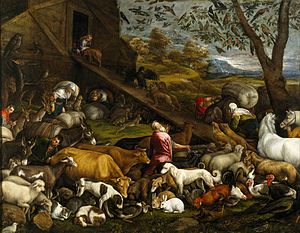Jehovah

Jehovah is the name of God the Father in the Old Testament that was first revealed to Moses. His Name uses four Hebrew consonants (יהוה, YHWH in the Roman alphabet),[1] which are known as the Tetragrammaton (Ancient Greek: τετραγράμματον). In the Bible, the name Jehovah first appears in Genesis 2:4.[2] He is also called Yahweh.
The meaning of Jehovah has been interpreted in many ways. God’s four-letter name, יהוה, is understood to mean “I am,” which is derived from the Hebrew verb “to be (הָיָה, hayah).”[3] Many scholars interpret it as “I am who I am.”[4]
Notation of Jehovah's Name
After the Babylonian captivity (6th century BC), and especially from the 3rd century BC on, Jews ceased to use the name Jehovah. At that time, the Jews took the third commandment, “You shall not misuse the name of the LORD your God,”[5]as not being allowed to call on the name of God. The people viewed God’s name as too holy and agreed that it should not be pronounced carelessly. During worship services in the synagogue, they read it as “Adonai' (אֲדֹנָי, My Lord). The Jewish Masoretes, who reproduced the original Hebrew text of the Bible from about the 6th to the 10th century, added to יהוה the vowel signs of the words Adonai and Elohim. In the Greek translation of the Old Testament (the Septuagint), Jehovah was translated as Kyrios meaning lord.[4]
In most English translations (NIV, NASB, RSV, KJV), Jehovah is translated as “The LORD”; and in German translations, “LORD (der Herr).” In French translations, Jehovah is translated as “l’Éternel” meaning “Eternal One.” When writing in Roman characters, the Name is written as YHWH, YHVH, JHWH, JHVH.
Other Titles for God
- El Elyon: God Most High (Genesis 14:18–20)
- El Roi: God who sees (Genesis 16:13)
- El Shaddai: God Almighty (Genesis 17:1)
- Elohe Olam: Everlasting God (Isaiah 40:28)
Terms Including Jehovah
- Jehovah Jireh: The LORD will provide (Genesis 22:14)
- Jehovah Nissi: The LORD is my banner (Exodus 17:15)
- Jehovah Shalom: The LORD is peace (Judges 6:24)
- Jehovah Tsebaoth: The LORD of hosts (1 Samuel 1:3)
- Jehovah Shammah: The LORD is there (Ezekiel 48:35)
Jehovah’s Work of Salvation
God the Father, God the Son, and God the Holy Spirit are one and the same (Trinity); God the Father led His work of salvation with a different name in each age for the salvation of mankind. The name of God the Father who worked in the Old Testament times is Jehovah.
From Adam to the Age of Patriarchs
Adam and Eve’s Sin

God Jehovah made all things. He made a man and a woman (Adam and Eve) and had them dwell in the Garden of Eden. In the garden, Adam and Eve were able to eat from the tree of life, which allowed them to live forever; however, due to the serpent's deception, they sinned and ate from the tree of the knowledge of good and evil, and were expelled from Eden.
Adam and Eve gave birth to Cain and Abel. Cain offered some of the fruits of the soil to God Jehovah, while Abel sacrificed a lamb as an offering to Him. Jehovah looked favorably on Abel's offering but did not look with favor on Cain’s.
(The system of sacrifice by the shedding of blood, which began with Abel, was passed down until Moses and was codified into the law.[6][7][8] This was to show that Jesus Christ would come into the world as the Lamb who would take away the sins of the world, and forgive the sins of mankind through His precious blood.[9][10])
Noah Saved From the Flood

In the days of Noah, the world was full of sin. God Jehovah judged the world with the flood, and let Noah, the righteous among the people of his time, build an ark beforehand to save his family and the land animals.
After the flood, Noah’s descendants gathered with an arrogant mind and attempted to build the Tower of Babel—a tower that would reach the heavens. God confused their language so that they could not understand each other and scattered them all over the earth.
Jehovah Made a Covenant With Abraham
Before Abraham left Ur, his hometown, God Jehovah appeared to him and promised to give him the land of Canaan.[11][12] Abraham obeyed His word and headed toward Canaan.
When Abraham was 99 years old, Jehovah made a covenant with Abraham. He said that He would be the God of his descendant (who was born the following year), and made circumcision a sign of the covenant.[13]
Isaac and Jacob Born With God’s Promise
When Abraham was 100 years old, his wife Sarah bore him a son, Isaac. Jehovah allowed Isaac to inherit Abraham’s estate.
When Isaac grew up, he had twin sons, Esau and Jacob. When the twins were still in their mother’s womb, God chose Jacob in advance to inherit the birthright and blessings of the firstborn. Jacob endured great pain and hardships in order to receive God’s blessing, and was later given the name Israel, which means to struggle with God.
The Israelites’ Life in Egypt
When there was a severe famine in the land of Canaan, Jehovah saved Jacob’s family by moving them to Egypt with the help of Joseph, Jacob’s eleventh son. As the years passed, the twelve tribes of Israel were formed from the twelve sons of Jacob, and they became a great nation in Egypt. The Pharaoh of Egypt noticed how numerous the Israelites had become and started to abuse them and forced them into slavery.[14]
From the Exodus to the Time of Judges
40-Year Life in the Desert

Jehovah appointed Moses as a prophet and set the Israelites free from Egypt through him. Jehovah divided the Red Sea and let the Israelites cross on dry ground, and was with them as a pillar of cloud by day and a pillar of fire by night. Throughout their life in the desert, God sent down manna from heaven for the Israelites.
It took them forty years to enter the promised land of Canaan. The 40-year history of Israel's journey in the desert was a time of refinement to test their faith in God and obedience to the covenant.[15]
Jehovah made a covenant by proclaiming the Ten Commandments on Mount Sinai the year they came out of Egypt. It was called the old covenant or the Law of Moses. While living in the desert, Jehovah educated the Israelites according to the covenant and the law, and said that He would make them His people if they obeyed. Most of the people who came out of Egypt, however, grumbled, complained, and forsook God’s covenant and eventually died in the desert. Among the males who came out of Egypt, only Joshua, Caleb, and the generation born in the desert entered Canaan.
Idolatry in the Age of the Judges
The Israelites who arrived in Canaan fought various battles and started to conquer the land; however, they failed to drive out all the Canaanites because they violated God’s word. Their disobedience led them to worship idols, following the customs of the Canaanites. Due to their sins, the Israelites were oppressed and abused by the people around them.
Jehovah would appoint judges to save Israel; however, whenever peace came, the Israelites forgot about God and sinned again. This vicious cycle of sin was repeated throughout the Ages of the Judges.
The Age of Kingdoms
United Monarchy
At the end of the Age of the Judges, the Israelites asked God to appoint a king like the nations around them. Jehovah appointed Saul as the first king of Israel. This was the beginning of the united monarchy.
After some time, Jehovah rejected Saul as king due to his disobedience and appointed David as king. David accomplished many things during his reign such as conquering the city of Zion, making Jerusalem the new capital, and moving the ark of the covenant to Jerusalem. Since David faithfully followed God’s covenant and law, there was peace in Israel.
During the time of King Solomon, David's son, the Jerusalem Temple was built and peace continued to stay in Israel. At the end of his reign, however, King Solomon followed his concubines and worshiped idols (1 Kings 1–11; 2 Chronicles 1–9).
Israel is Divided: South Judah and North Israel

After King Solomon’s death, Israel was weakened and divided into two: the southern kingdom of Judah and the northern kingdom of Israel.
From the time of the first king, Jeroboam, North Israel betrayed God’s covenant and worshiped the golden calf. From there, they continued to revel in idolatry as they worshiped pagan gods such as Baal and Asherah. Due to their disobedience, North Israel lost God's protection and was destroyed by Assyria around 721 BC.
When it came to South Judah, however, they were protected by God because there were some kings who served God faithfully. For example, King Jehoshaphat defeated the invasion of Moab and Ammon by keeping the laws of God; and King Hezekiah obeyed God's command to keep the Passover, which had not been kept for a long time. Due to their obedience, God protected South Judah and kept the kingdom safe from the invasion of Assyria.
From Babylonian Captivity to the Return to Jerusalem
The southern kingdom of Judah forsook the covenant of God and perished by Babylon (New Babylonia) around 586 BC. The people were taken captive and Jerusalem, the capital city, was turned into a wasteland. Jehovah prophesied that they would return to their homeland after 70 years of captivity.[16]
Those who believed in the prophecy and endured in Babylon returned to their homeland with joy after Babylon was overthrown by the Persian Empire. The people believed they were invaded by the Gentiles and became wanderers because they forsook the covenant and the laws of God. Because of this, they made every effort to rebuild the Jerusalem Temple and obey the laws of God. They continued to do this until Jesus came.
What Happened in the Past Is a Shadow of Things to Come
The work of salvation that Jehovah led in the Old Testament is a copy and shadow of the salvation work that the Messiah, the Christ, will accomplish when He comes to this world..
The law is only a shadow of the good things that are coming—not the realities themselves.
The prophecies that Jehovah left in the Bible provide proof of who Christ is.
“You diligently study the Scriptures because you think that by them you possess eternal life. These are the Scriptures that testify about me,”
History is repeated, and the prophecies are fulfilled in the New Testament.[17][18] In addition, the 40-year history of the Israelites in the desert and the rise and fall of Israel in the Old Testament are also examples and lessons that show who can receive God’s blessings in the New Testament times.[19][20]
Jehovah established the covenant and law with His chosen people and showed His favor upon those who obeyed Him with faith. Christ, who came in the New Testament times, established the new covenant and the law of Christ for the chosen, and He gives blessings to those who keep the new covenant.
See also
External links
- The History of God Jehovah’s Redemptive Work Through the Old Testament
- World Mission Society Church of God Official Website
References
- ↑ "Exodus 3:15". Bible Hub.
- ↑ "Genesis 2:4".
- ↑ "Exodus 3:14–15".
- ↑ 4.0 4.1 "Yahweh", Britannica
- ↑ "Exodus 20:7".
- ↑ "Genesis 8:20–21".
- ↑ "Genesis 12:7".
- ↑ "Genesis 15:9".
- ↑ "John 1:29".
- ↑ "Romans 3:23–25".
- ↑ "Genesis 12:1".
- ↑ "Acts 7:2–3".
- ↑ "Genesis 17:10".
- ↑ "Exodus 1:1–22".
- ↑ "Deuteronomy 8:1–16".
- ↑ "Jeremiah 25:11".
- ↑ "Ecclesiastes 1:9–10".
- ↑ "Isaiah 46:10".
- ↑ "1 Corinthians 10:5–11".
- ↑ "Romans 15:4".





